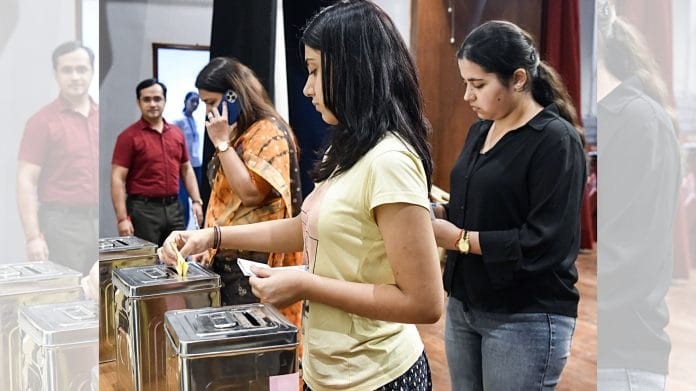New Delhi: Delhi University (DU) is considering revamping the format of its student union elections by conducting them in two phases to prevent “defacement” of property and the “use of muscle and money power”, but the move has faced backlash from both students and faculty, who called it undemocratic.
The matter came up at the Thursday meeting of the executive council (EC), the university’s top decision-making body. In a document shared at the meeting, the administration proposed that only students who win union elections at their college or department-level take part in the voting to elect the four Delhi University Students Union (DUSU) office-bearers. ThePrint has seen the document.
Presently, students from over 50 colleges directly vote to elect the DUSU leaders.
The proposal was also included in a report submitted by DU to the Delhi High Court after the court reprimanded students for defacing public property during last year’s elections. The court paused the vote count for nearly two months until the issue of defacement was addressed.
In response, according to the document, the DU formed a reform committee and proposed alternative measures to the court, including the two-tier election system, which university officials described as a potential future consideration rather than a final decision.
On Thursday, however, the discussions adjourned without any final decision with the option to revisit the matter as a separate agenda item at the next meeting.
Also Read: Delhi student politics is changing. New DUSU president’s use of fear and force has many fans
What the university proposed
The DU has proposed significant changes to the current format of the student union elections by replacing the centralised and single-tier election system with a two-tier system.
Under this new structure, elections would first be held at the college, department, centre, and institute levels, with the elected representatives—such as the presidents of the College Union, Department Union, and Centre Union, along with the central councillors—participating in the second-tier election to choose the DUSU office-bearers.
This two-tier model is already in use for elections to DU’s Internal Complaints Committee and could serve as a precedent for the proposed changes in the student union elections.
This system of elections, the document said, is in line with the University Grants Commission’s Lyngdoh Recommendations. These recommendations form the basis of student union elections in India.
Clause 6.2.4 of Lyngdoh Recommendations says, “A system of election wherein class representatives shall be directly elected in the colleges and universities campus and they in turn shall elect the office bearers for the college unions and the university campus union. Also, they shall elect their representatives for the university student union.
“These elected representatives from colleges and university campuses shall form the Electoral College, which shall elect the office bearers of the university student union. This model shall be applicable to large universities with a large number of affiliated colleges,” it adds.
DU registrar Vikas Gupta told ThePrint that the proposal was under deliberation and will not be implemented immediately and without consultations.
“It takes time to implement any big change. We assure that nothing will be implemented abruptly without proper deliberations,” he said.
Students, teachers oppose proposal
However, students and faculty members have come out strongly against it.
Sarthak Sharma, the ABVP state secretary, called it an “outrageous attempt to undermine students’ democratic rights”.
He argued that the plan to implement an indirect election system was a deliberate effort to reduce student participation in the democratic process.
“This is a conspiracy by the university administration to limit student involvement in elections and ABVP cannot accept it,” he said. “ABVP would escalate protests to demonstrate the strength of the student body.”
In a post on X (formerly Twitter), DU secretary for the All India Students Association (AISA) said the group called for the rollback of the proposal in a demonstration outside the vice-chancellor’s office Thursday.
यूनियन के अधिकार पर हमला नहीं सहेंगे!
Defend the right to Union!
Today, AISA protested at Delhi University Vice Chancellor's Office against the proposal to the DU Executive Council of indirect elections to the DU Students' Union!
Right to Union long live! pic.twitter.com/whSrf4enql
— Anjali (@anjali__27) February 27, 2025
Concerns were also raised by the Democratic Teachers’ Front, a group of faculty members, who pointed out the timing and nature of the proposal.
“The introduction of this change coincides with the National Education Policy (NEP) 2020’s lack of focus on campus democracy, which some view as part of a broader shift toward promoting saffronised, crony capitalist interests,” the forum said in a statement released shared with media Thursday.
“This has led to fears that corporate-driven agendas are beginning to dominate academia.”
Mithuraaj Dhusiya, a teacher at Hansraj College and an EC member, expressed concerns over how the proposal was introduced. He said that any change to the election process for DUSU should not be imposed from the top down.
“Such a change should be discussed thoroughly as an agenda item in a regular EC meeting, with extensive consultations involving all stakeholders, including students and faculty,” Dhusiya said, emphasising the need for a democratic and inclusive approach.
(Edited by Sanya Mathur)






